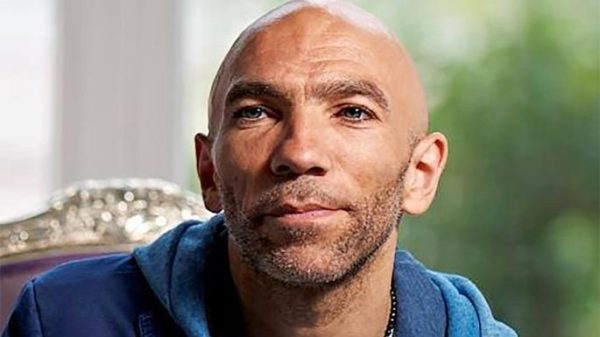After struggling to land roles in the arts, a white theater director embraced his chosen identity as a “born again African” and steadily boosted his career with taxpayer funding intended for minority artists and creators.
Anthony Ekundayo Lennon, who chose his very own African name, worked on all-Black productions last year and snagged a paid internship as a “theatre practitioner of color,” The Sunday Times reported. Despite being born to two Irish parents, Lennon insisted he’s gone through “the struggles of a Black man” because he was bullied as a child by folks who saw him as mixed race and targeted him with hateful slurs.

Anthony Ekundayo Lennon said he was bullied as a child by people who thought he was mixed race. (Image courtesy of Twitter)
“Everybody on the planet is African,” he said in a book he authored 10 years ago. “It’s your choice as to whether you accept it.”
According to the newspaper, Lennon started his career as trainee with a Black-led theater company in Shoreditch, England, named Talawa where he painted himself as an individual with mixed-race heritage. He has most recently served as an assistant director on Britain’s first all-Black production of the musical “Guys and Dolls.”
Lennon would later become one of four people awarded a portion of a £406,500 ($530K) grant as part of a two-year internship funded by the Arts Council of England. The council said it was “satisfied” the director was eligible for the award because he’d identified as a mixed race person for so long, but acknowledged Lennon’s case was as “unusual” one.
Still, the group argued its decision to support Lennon with the grant didn’t “undermine the support we provide to Black and minority ethnic people within the theatre sector.”
Some folks begged to differ, however, and were less than pleased after learning the Irish-born actor had benefited from funding meant for Black, Asian and minority ethnic leaders (BAME) in the arts community.
“When I discovered his background, I thought it was unfair that a white man had taken a black person’s place on a BAME scheme,” one Black actor told The Sunday Times. Fellow Black actor Luke Elliot fumed to The Independent that Lennon was “taking up the little resources” awarded to Black artists.
Even amid the backlash, Lennon said he’ll continue to identify as a Black man. He even chose new name, Taharka, saying that his given name no longer fulfilled him.
“Taharka is the name of an Egyptian pharaoh and Ekundayo means ‘weeping becomes joy,’ he told the newspaper. “‘I was at a stage in my life where to address myself as Anthony Lennon did not fulfill me; it didn’t seem to allow me to express myself as I saw fit.”
Lennon’s story seems to echo that of that of U.S. woman Rachel Dolezal, aka Nkechi Amare Diallo, who’s now as social pariah after pretending to be a Black American woman. Dolezal, who headed the NAACP branch in Spokane, Washington, was also born to white parents but assumed a “transracial” identity.
Lennon can relate.
“When I’m alone in my bedroom looking in the mirror, thinking about stuff I’ve written down, thinking about my past relationship-wise, pictures on the wall, I think I’m a black man,” he said in a 1990 episode of the BBC series “Everyman.” “I’ve not said that to anyone. And I won’t say it outside.”

